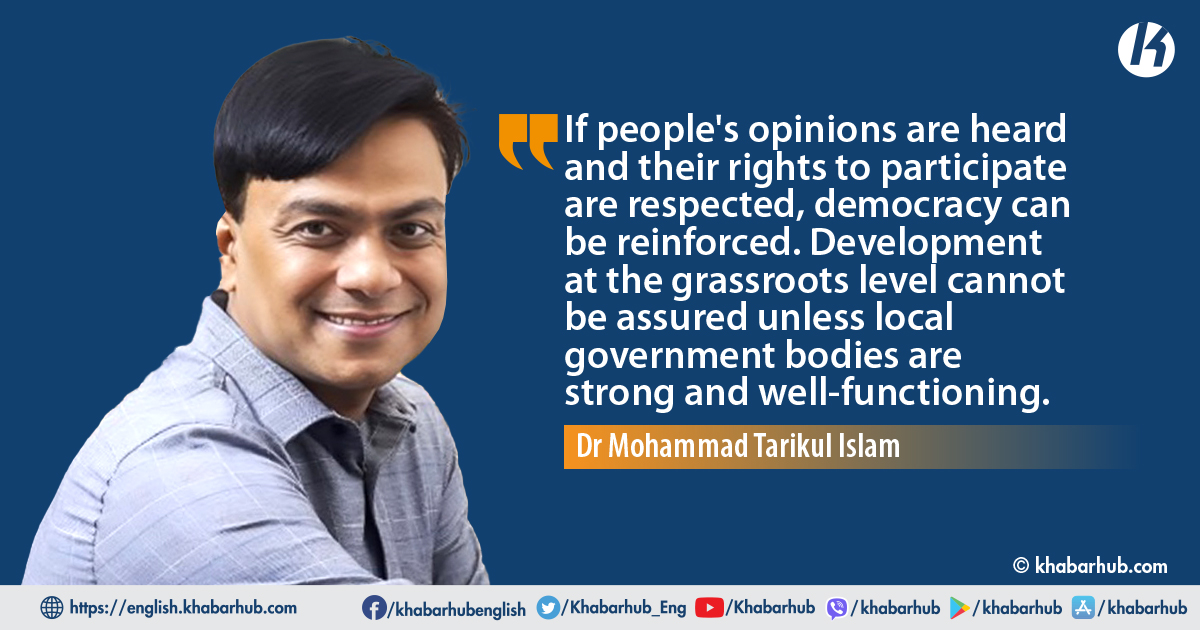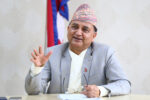Decentralization is often linked to the concept of active participation in decision-making processes augmenting democratic values.
Indeed, local representative authorities with actual discretionary powers are the basis of decentralization that can lead to local efficiency, equity and development.
Effective local institutions can develop and implement policies that are in line with citizens’ aspirations, thereby improving the quality of public services and promoting local development.
Bangladesh is a unitary state with a constitutional provision for local government (LG) bodies to provide all necessary amenities.
Decentralization is specifically mentioned in the Bangladesh constitution. Zilla Parishad (District Council, the highest level of rural local government tier) is the oldest local government tier in Bangladesh.
Still, it has much room for improvement in order to provide quality services to the citizens as there were no elected representatives onboard.
It is for the first time in the history of Bangladesh, that elected representatives of Zilla Parishad (ZP) resumed office in 2017.
Need to establish ZP websites, promote the citizen charter and publish all development and financial papers, hold regular public hearings, and invite local communities, CBOs, and NGOs to ZP meetings. ZP shall involve the public in environmental and social assessments of development projects, as well as conduct annual Upazila Parishad social audits.
Zilla Parishad Act (2000 and 2022) has given the mandate to the Zilla Parishad to perform development activities by developing an annual and five-year plan in consultation with other local government institutions and individuals considering its financial capability.
Zilla Parishad: Existing Challenges
Revenue discretion is limited, and fiscal transfers from the national government to ZP are made. Under the current LGI framework, ZPs have only limited revenue discretion.
According to the law, LGIs can only collect revenue from the sources specified by the national government. They are not authorized to look for alternative tax bases.
Even within the limited discretion, ZP currently has limited capacity to effectively collect the revenues from the sources assigned to them.
In addition, ZP receives limited funds compared to their actual needs under the current inter-governmental fiscal transfer system.
Inadequate funding is indeed a major constraint on the ability of ZPs to perform effectively their mandated functions. Further, deconcentrate decision-making power on service delivery.
Currently, ZP plays some roles in the delivery of local services and local administration offices provide these services as well.
Due to a fragmented legal framework, the legal assignment of functions and expenditure responsibilities to ZP remains unclear, and there is a significant gap between legally assigned functions and their actual capacity to perform their functions.
The lack of coordination between ZP and district administration offices in delivering services has been identified as a major impediment to effective local service delivery.
The main impediment to effective coordination is the distance between the frontline service delivery unit where the service is delivered to citizens and the officials who ultimately have decision-making power over local service delivery often sitting at the District (Zilla) level or national government.
Therefore, there is a need to deconcentrate decision-making power on service delivery to the ZP level, thereby reducing coordination failures and improving local services.
A major challenge in the current local government system is limited opportunities for meaningful participation of local citizens and weak upward and downward accountability.
There is a wide consensus today that a more devolved and effective local government system is crucial for making the development agenda more pro-poor, widening participation in decision-making, and ensuring that resources are directed to where they are most needed, thereby increasing allocative efficiency.
For instance, ZP standing committees are not operational. However, these committees are not active in about 90% of the ZP because the elected chairmen and other members are not properly aware and interested in its functions and jurisdictions.
Strengthening Zilla Parishad: Recommendations and Way Forward
Partnership Expansion and Consensus Building: To increase the effectiveness of ZP, it is necessary to identify all important stakeholders and involve them in the development process. Encourage local dialogue processes; Through debate and dialogue, ZP can create on-demand.
Developing ZP Five-Year Plan and Annual Plan: With the preparation of the ZP Annual Plan, ZP must gather the essential information to produce the Five-Year Plan.
In compliance with the ZP Act, ZP must hold a special ZP meeting and approve the project list. ZP must submit the annual plan to the DDLG and LGD by the deadline. ZP shall include the recommendations of the Standing Committees in the annual plan.
Citizen’s Participation in the ZP: ZP takes the required steps to activate standing committees, as committees allow for informal dialogue among members, which is vital for the formation of ties amongst members with various political ideas.
Local governments may need legal and institutional reforms to cope with accountability between elections reforms, such as a citizen’s charter and a system for recalling public officials.
Committee meetings provide a place for collaboration and resolution. The committee members must demonstrate endurance, steadiness, and sequential knowledge.
Commercializing establishments and assets of ZP: ZP must identify current ZP businesses as well as determine ZP’s assets and work out renovation plans for existing establishments as well as additional investment in available assets.
In compliance with the ZP Act, a special ZP meeting must be held to approve the development plan. ZP should form a standing committee to manage them, and ZP should create a comprehensive plan and budget. An M&E system is required.
Assess Capacity Assets and Needs: ZP can mobilize and design the capacity assessment exercise. ZP must conduct a capacity evaluation. ZP should work with appropriate entities such as NILG to change knowledge and skills.
Financial accountability and sustainability: Within three months of the end of the fiscal year, the ZP must introduce computerization of the accounting system by computerizing tax records and generating bills by computer, as well as prepare financial statements and have them reviewed by the ZP audit standing committee (internal audit).
ZP Create a performance-based budget allocation, i.e., make governance reform a prerequisite for receiving funding for infrastructure improvements.
Ensuring Transparency and Accountability: ZP must prepare and propose a Citizen Charter in the Zilla Parishad Complex.
Need to establish ZP websites, promote the citizen charter and publish all development and financial papers, hold regular public hearings, and invite local communities, CBOs, and NGOs to ZP meetings. ZP shall involve the public in environmental and social assessments of development projects, as well as conduct annual Upazila Parishad social audits.
Bridging the coordination gap
The sake of delivering services has been raised as an important obstacle to the effective delivery of local services.
There is a need to deconcentrate decision-making power on service delivery to the ZP level, and thereby reducing coordination failures and improving local services. ZP can be made “vocal” as far as areas of local administration are concerned.
This will give people the feeling of being participative in the process of governance. Encouraging the growth of both local accountability and improved performance at that level is essential.
To materialize the dream of building a democratic Bangladesh free from poverty, building a strong local government is a must.
As such, bringing about reforms in the local government is now the demand of the time. The Charter of Change or Vision 2021, to turn Bangladesh into a respectable nation with the transformation of political culture and making the society corruption free, will be difficult to achieve unless a strong, honest and dedicated local-level governance system emerges to support the central government
Reforming local government institutions requires agreement on fundamental principles. This principle encourages governments to do the right thing by providing services consistent with citizens’ preferences.
In addition, the government should manage its fiscal resources carefully. It should gain citizens’ trust by performing better and paying less, as well as managing the community’s economic and social risks.
The Charter of Change or Vision 2021, which aims to transform Bangladesh into a respectable nation by transforming political culture and ridding society of corruption, will be difficult to achieve unless a strong, honest, and dedicated local-level governance system emerges to support the central government.
It should perform to increase the quality and quantity of public services as well as access to them. To provide it, it must benchmark itself to the best-performing local governments.
A local government should respond to its citizens. To guarantee that it serves the public interest with integrity, it should adhere to proper safeguards.
Local governments may need legal and institutional reforms to cope with accountability between elections reforms, such as a citizen’s charter and a system for recalling public officials.
Most significantly, and perhaps ironically, a culture of accountability emerges from a collaboration between civil society and proper institutions, which are typically formed by a powerful central political force.
A large allotment from the ADP may be provided to satisfy the financial needs of local government institutions, which would enhance their capability and ensure grassroots development.
The honorarium paid to the elected chairman and members should be increased, as well as an environment should be established that allows for the election of honest and capable persons.
The ZP standing committees can be activated by joint monitoring and supervision of both public agencies and civil society bodies.
In Bangladesh, the local government as a political institution focused on ensuring development and public participation in development activities is far from being an effective tool of governance.
Being mostly poor and illiterate, particularly at the grassroots, the people approach the local public representatives, whom they consider as local guardians aware of their needs and feelings.
However, no attempt was taken to prepare them. In reality, elected local bodies in administrative units ensure the effective involvement of the people in decisions that affect them, and this participation is a precondition for the development of a democratic polity at all levels, which will strengthen its roots.
If people’s opinions are heard and their rights to participate are respected, democracy can be reinforced. Development at the grassroots level cannot be assured unless local government bodies are strong and well-functioning.
A paradigm shift in government is required, shifting from imposing development to supporting rural development, and from teaching local people to learning together with them. Human security must be included in existing mainstream rural development approaches.
Building a strong local government is essential for achieving the dream of a poverty-free democratic Bangladesh. As a result, bringing about reforms in local government is now a crucial demand.
The Charter of Change or Vision 2021, which aims to transform Bangladesh into a respectable nation by transforming political culture and ridding society of corruption, will be difficult to achieve unless a strong, honest, and dedicated local-level governance system emerges to support the central government.
Allow the local community to take the lead and drive social change. While NGOs are still likely to be mainly concerned with the basics of improving human development, being involved in human security projects helps to improve NGOs as organizations and to reinforce and expand the contribution they can make to the people with whom they currently work.
To make development meaningful, people must be directly involved in the formulation and implementation of decisions.
This requires the decentralization of democracy to the most basic levels. Allow political parties and relevant stakeholders, including community members, to learn from this experience and overcome these challenges in the greater national interest.
A paradigm shift in government is required, shifting from imposing development to supporting rural development, and from teaching local people to learning together with them. Human security must be included in existing mainstream rural development approaches.
(Dr. Mohammad Tarikul Islam is an Associate Professor of Government and Politics at Jahangirnagar University, Bangladesh)








Comment